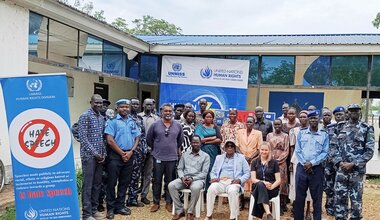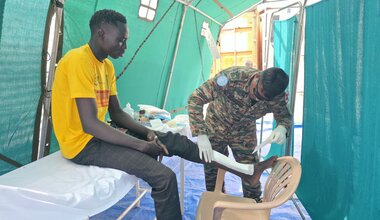Cholera cases top 1,700, risk still high
16 June 2014 - The number of cholera cases reported in Juba has risen to 1,720, including 37 deaths, and the risk of infection is still high, according to a statement released today by the Ministry of Health.
People were still in danger of contracting the disease due to health practices, the statement said.
“They (the population) continue to drink unsafe water, consume unhygienically prepared food, practice open defecation and participate in handling and burial of people who have died from cholera,” it stated.
The statement, referring to statistics as of 14 June, noted that 25 cases have been reported inside the UNMISS Tomping and 22 at UN House civilian protection areas.
“However, the numbers reported inside of the camps are much less than those reported outside the camp,” the statement says. “This is partly for two reasons -- the (vaccination) … campaign that was conducted in the camps and the hard work of all health … partners.
In the capital Juba, where cases have been reported in eight payams (districts), two new cholera treatment centres (CTCs) have been opened, bringing the total number to six, the statement said.
World Health Organization (WHO) activities to combat the disease have boosting a network to capture community cases and deaths and monitoring health facilities to ensure all patients are referred to the CTCs.
WHO has also been collecting samples to confirm cholera at the Central Public Health Laboratory as well as setting up Oral Rehydration Points (ORPs) at key locations to prevent severe dehydration at the community level.
UNICEF has been conducting house-to-house visits as well as engaging with the media. It has been working closely with the City Council and State Ministry of Water to supply clean water to all areas within Juba. Garbage bags have also been distributed at household levels and garbage dumping sites disinfected.
The children’s agency has also been training hygiene promoters, who are currently moving house to house to educate the publicand distributing water treatment supplies. In addition, it has been setting up hand washing stations in various places in town.
 UN
UN United Nations Peacekeeping
United Nations Peacekeeping





